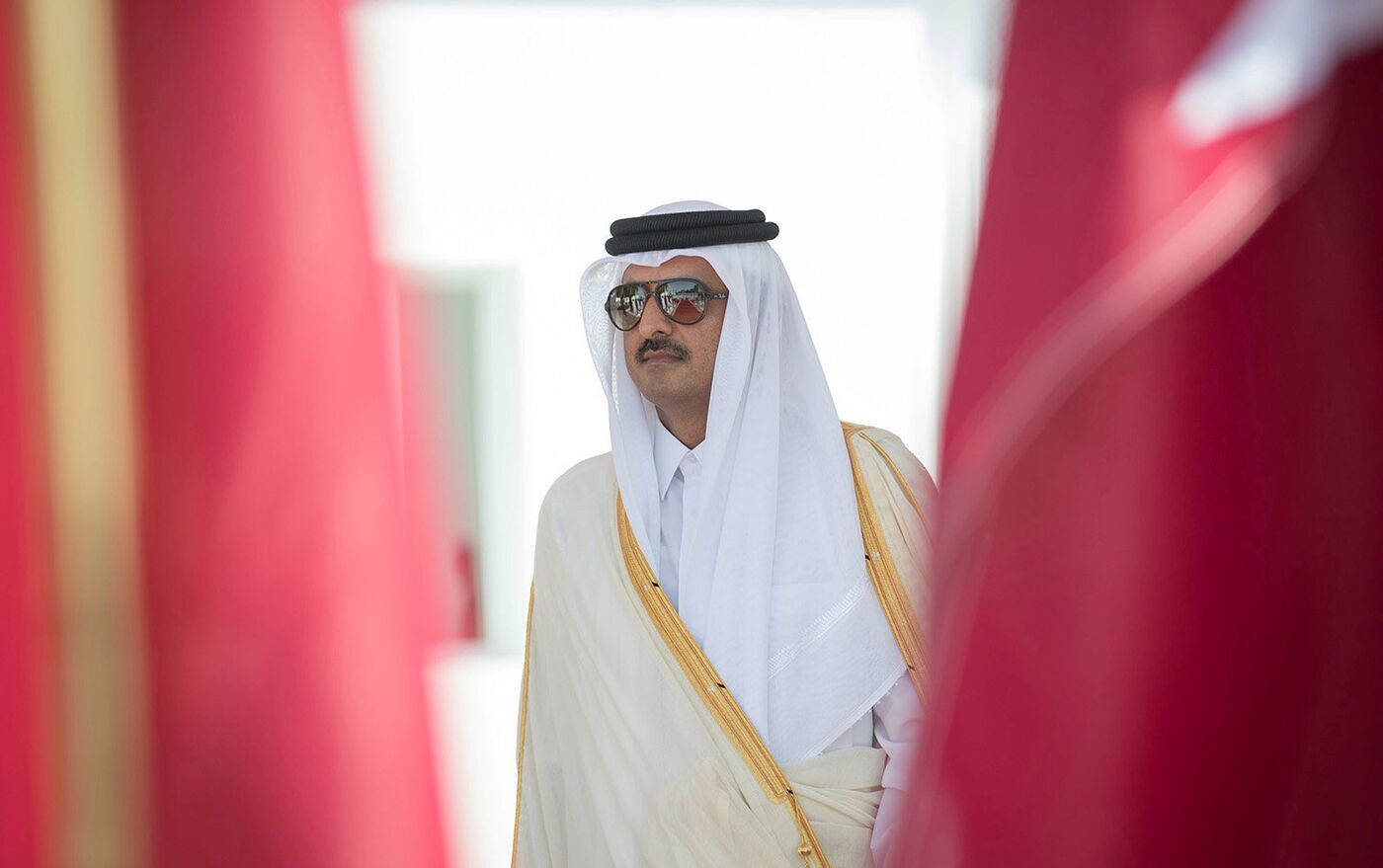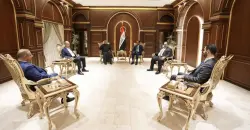Tamim's visit to Baghdad: gas agreements and favorable regional prospects for Iraq

Shafaq News / The recent visit of Sheikh Tamim bin Hamad Al Thani, the Emir of Qatar, to Baghdad signifies a potential resolution of the tumultuous relationship between the two nations. Historically, Qatar's political and media positions concerning the level of violence and terrorism in Iraq have drawn frequent criticisms.
This marks Sheikh Tamim's second visit to Baghdad within a span of two years. The first visit occurred within a "regional-international" framework, as it was held under the auspices of French President Emmanuel Macron and former Iraqi Prime Minister Mustafa Al-Kadhimi. The purpose of the visit was to host the Baghdad summit, which also brought together Egyptian President Abdel Fattah al-Sisi and Jordanian King Abdullah, along with the foreign ministers of Iran, Turkey, Saudi Arabia, Kuwait, and the United Arab Emirates.
In contrast, this present visit by Sheikh Tamim is considered "important" by the government of Mohammed Shia Al-Sudani, taking on a different form and setting. It comes approximately six months after Al-Sudani's trip to Doha to attend the World Cup. Despite subsequent visits by the Iraqi Prime Minister to Saudi Arabia, the United Arab Emirates, and Kuwait, Qatar's capital had not been included in any official or working visits.
The significance of Sheikh Tamim's trip to Baghdad suggests that the era of strained relations between Iraq and Qatar, primarily caused by terrorism, may have reached its conclusion. Qatar had been accused of supporting the unrest that erupted in western Iraq over a decade ago. It did so by propagating the turmoil through its influential media channels, portraying it as popular "revolutions" against the perceived "injustice and domination" of the Shiite-led coalition rule, among other grievances. Moreover, there are reported links between Qatari funds and the armed factions of terrorist organizations operating in Syria and Iraq.
A notable turning point in Qatari policies occurred in 2017, triggered by the announcement of Saudi Arabia, Bahrain, the UAE, and Egypt's estrangement from Doha. This rift stemmed from various accusations, including Qatar's relations with Iran, its support for political and media opposition in the Gulf, hosting dissidents on its territory, deviating from the Gulf consensus, and other criticisms.
Analyses focusing on this matter suggest that the Saudi-led boycott had a significant impact on Qatar's economy, particularly due to the restriction on its aircraft from flying through the airspace of the regional countries. Consequently, Qatar was compelled to seek alternative routes, including relying on Iran, to facilitate the transit of its aircraft, maintain commercial travel, and secure supplies of essential commodities. While this move helped alleviate Qatar's isolation, it also necessitated a reassessment of its regional policies, particularly those pertaining to Iraq.
Simultaneously, the boycott coincided with the announcement of the defeat of ISIS in Iraq, Syria, and Lebanon. Although the Iraqi government and Peshmerga forces successfully regained control over the areas previously occupied by the terrorists, this outcome seemingly prompted Qatar to adjust its positions concerning the Iraq war. However, a similar achievement has not been realized in Syria, potentially explaining why Qatar maintains a firm stance against the Syrian regime.
Qatar's growing focus on Iraq is exemplified by its substantial involvement in a $27 billion deal with the French company Total Energy. Qatar Energy has acquired an estimated 25% stake in the project, which entails the exploration, transportation, and pumping of water from the sea.
Moreover, the visit of the Emir of Qatar holds significant political and economic implications, as highlighted by Basim al-Awadi, the spokesman for the Iraqi government. The discussions between the Iraqi and Qatari parties will encompass major strategic projects, such as the completion of the development road recently inaugurated by al-Sudani from the Grand Faw Port towards Turkey. This road aims to connect Iraq with countries in the region and Europe, serving as a bridge between the East and the West, as reported by the "National" newspaper.
The discussions between the two nations are also expected to include joint energy projects. Qatar's presence at the inauguration conference of the Development Road last month, which was attended by representatives from Iran, Turkey, Syria, Jordan, and the Gulf Cooperation Council (G.C.C.) nations, indicates its commitment to enhancing regional collaboration and economic prospects. The $17 billion initiative aims to foster regional integration and strengthen economic cooperation.
Therefore, Sheikh Tamim's visit to Baghdad occurs at a significant juncture for Iraq, particularly following the steady improvement in its relations with G.C.C. countries, which has been accompanied by reciprocal visits from senior officials. Notably, Iraqi Oil Minister Hayyan Abdul Ghani visited Doha and participated in an economic forum in May, where he announced that Qatari companies expressed interest in participating in obtaining oil and gas exploration rights in Iraq.
Furthermore, Qatar's increased involvement in Iraq's energy sector not only provides a significant boost to al-Sudani's government by attracting foreign investment amid the withdrawal of major Western companies from the Iraqi market, but it also aligns with the stated objectives of the United States. These objectives include the desire to electrically separate Iraq from Iran and strengthen Baghdad's ties with its Gulf, Jordanian, and Egyptian neighbors.
Simultaneously, Qatar's entry into the Iraqi energy market, particularly in the gas sector, and the consequent reduction of Iraq's reliance on Iranian energy sources, helps fill the gap left by the Russian-Ukrainian War. This move also supports the U.S. efforts to diminish Russian influence in the global energy market.
However, analysts caution that there is a risk associated with the American reliance on Qatar in blocking gas supplies, both from internal and foreign markets, as is currently the case with Iraq. This indicates that Washington is becoming less dependent on its Saudi "big brother" to fulfill such crucial regional and international roles. The U.S. administration under President Joe Biden has already requested Saudi Arabia's contribution to mitigating the global rise in energy prices due to the Ukrainian war, but this request was not heeded in Riyadh.
Furthermore, as reported by the National newspaper, Qatar Power has taken significant steps to strengthen its presence in the Iraqi energy sector. This further emphasizes Qatar's growing influence in Iraq's energy landscape.
It can also be observed that while Qatar seeks to expand its presence in the Iraqi gas sector, al-Sudani, on the other hand, is making efforts to attract more Qatari investments, particularly towards the "development road" project. This project has received support from Turkish President Recep Tayyip Erdogan, a close ally of Sheikh Tamim. Similar to the support extended by Iran around six years ago when Doha faced sanctions and a blockade from its Saudi neighbor, Erdogan was among the first to provide assistance to Qatar during that period.
Furthermore, it is worth noting that Qatar maintains discreet relations with its Iranian neighbor. There is constant contact and coordination between the two countries, and they exchange visits. Qatar has consistently expressed its opposition to any escalation in the Western or regional countries' policies towards Iran, particularly concerning its nuclear file.
Observers have noticed that Qatar has taken note of Iraq's role in contributing to the improvement of relations between Iran and Saudi Arabia over the past two years. This positive development also facilitated Chinese mediation in the reconciliation between Tehran and Riyadh. Qatar is also closely monitoring behind-the-scenes efforts towards a potential reconciliation between Tehran and Cairo. This comes after the Turkish ally achieved a significant breakthrough in its relations with President al-Sisi.
Given these factors, it is no longer surprising to witness the road leading to Baghdad International Airport adorned with Qatari flags and banners, warmly welcoming Sheikh Tamim's visit.
Exclusive to Shafaq News Agency.





